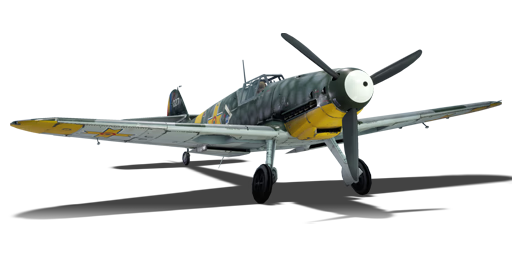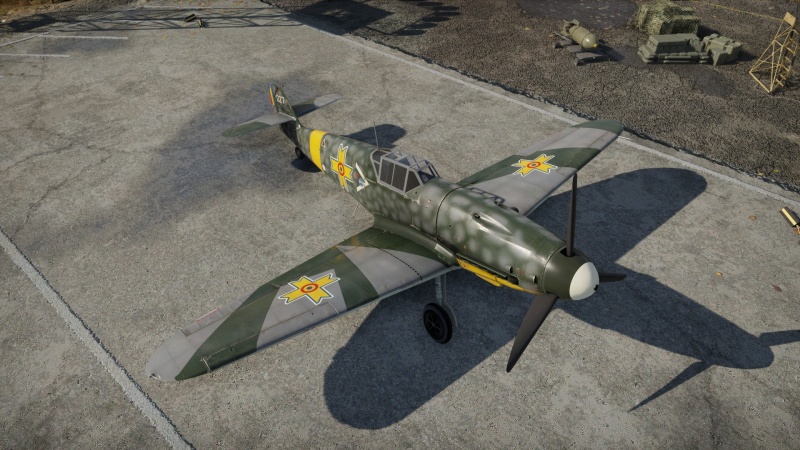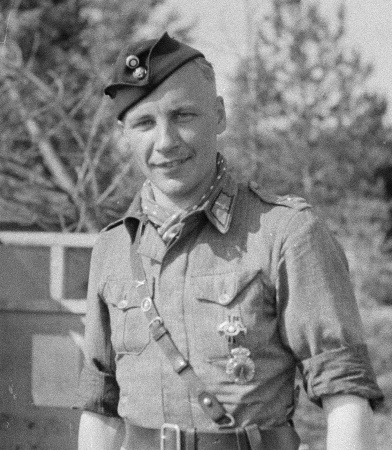Difference between revisions of "Bf 109 G-2"
(Edits) |
(→In-game description: Reformatted) |
||
| Line 168: | Line 168: | ||
== History == | == History == | ||
<!-- ''Describe the history of the creation and combat usage of the aircraft in more detail than in the introduction. If the historical reference turns out to be too long, take it to a separate article, taking a link to the article about the vehicle and adding a block "/History" (example: <nowiki>https://wiki.warthunder.com/(Vehicle-name)/History</nowiki>) and add a link to it here using the <code>main</code> template. Be sure to reference text and sources by using <code><nowiki><ref></ref></nowiki></code>, as well as adding them at the end of the article with <code><nowiki><references /></nowiki></code>. This section may also include the vehicle's dev blog entry (if applicable) and the in-game encyclopedia description (under <code><nowiki>=== In-game description ===</nowiki></code>, also if applicable).'' --> | <!-- ''Describe the history of the creation and combat usage of the aircraft in more detail than in the introduction. If the historical reference turns out to be too long, take it to a separate article, taking a link to the article about the vehicle and adding a block "/History" (example: <nowiki>https://wiki.warthunder.com/(Vehicle-name)/History</nowiki>) and add a link to it here using the <code>main</code> template. Be sure to reference text and sources by using <code><nowiki><ref></ref></nowiki></code>, as well as adding them at the end of the article with <code><nowiki><references /></nowiki></code>. This section may also include the vehicle's dev blog entry (if applicable) and the in-game encyclopedia description (under <code><nowiki>=== In-game description ===</nowiki></code>, also if applicable).'' --> | ||
| − | |||
| − | + | {{break}} | |
| + | {{Navigation-Start|{{Annotation|Archive of the in-game description|An archive of the historical description of the vehicle that was presented in-game prior to Update 1.55 'Royal Armour'}}|expand=true}} | ||
| + | {{Navigation-First-Simple-Line}} | ||
The Messerschmitt Bf 109 was a single-seat monoplane fighter used by the Luftwaffe before and during WWII. It was used as a fighter, interceptor, high-altitude interceptor, fighter-bomber and reconnaissance aircraft. | The Messerschmitt Bf 109 was a single-seat monoplane fighter used by the Luftwaffe before and during WWII. It was used as a fighter, interceptor, high-altitude interceptor, fighter-bomber and reconnaissance aircraft. | ||
| Line 176: | Line 177: | ||
However, the increased equipment led to heavier weight on the Gustav, in fact 10% heavier than the Friedrich. Compared to the much earlier Bf 109B, the Gustav was almost 46% heavier. The new aircraft had begun to reach front-line units by May 1942. In essence, the Bf 109 design had reached its peak, and would ideally need to be replaced with newer, more modern designs. However, the troubled Me 209 replacement was still in development and things at the front were beginning to look ominous for Germany. Consequently, the RLM decided to continue to further refine the 109. | However, the increased equipment led to heavier weight on the Gustav, in fact 10% heavier than the Friedrich. Compared to the much earlier Bf 109B, the Gustav was almost 46% heavier. The new aircraft had begun to reach front-line units by May 1942. In essence, the Bf 109 design had reached its peak, and would ideally need to be replaced with newer, more modern designs. However, the troubled Me 209 replacement was still in development and things at the front were beginning to look ominous for Germany. Consequently, the RLM decided to continue to further refine the 109. | ||
| + | {{Navigation-End}} | ||
== Media == | == Media == | ||
Revision as of 16:33, 20 November 2022
| This page is about the gift German fighter Bf 109 G-2. For other versions, see Bf 109 (Family). |
Contents
Description
The Bf 109 G-2 is a premium gift rank German fighter with a battle rating of (AB), (RB), and (SB). It was introduced as a premium pack in Update 1.43. This Bf 109 represents a version serving in the Romanian Air Force.
General info
Flight performance
| Characteristics | Max Speed (km/h at 6,700 m) |
Max altitude (metres) |
Turn time (seconds) |
Rate of climb (metres/second) |
Take-off run (metres) | |||
|---|---|---|---|---|---|---|---|---|
| AB | RB | AB | RB | AB | RB | |||
| Stock | 673 | 656 | 20.0 | 20.7 | 19.5 | 19.5 | 250 | |
| Upgraded | 721 | 696 | 18.1 | 19.0 | 27.7 | 23.1 | ||
Details
| Features | ||||
|---|---|---|---|---|
| Combat flaps | Take-off flaps | Landing flaps | Air brakes | Arrestor gear |
| ✓ | ✓ | ✓ | X | X |
| Limits | ||||||
|---|---|---|---|---|---|---|
| Wings (km/h) | Gear (km/h) | Flaps (km/h) | Max Static G | |||
| Combat | Take-off | Landing | + | - | ||
| 437 | 408 | 260 | ~13 | ~6 | ||
| Optimal velocities (km/h) | |||
|---|---|---|---|
| Ailerons | Rudder | Elevators | Radiator |
| < 450 | < 390 | < 450 | > 450 |
| Compressor (RB/SB) | ||
|---|---|---|
| Setting 1 | ||
| Optimal altitude | 100% Engine power | WEP Engine power |
| 6.700 m | 1,280 hp | 1,422 hp |
Survivability and armour
Very minimal armour protecting the pilot and engine.
Modifications and economy
Armaments
Offensive armament
The Bf 109 G-2 is armed with:
- 1 x 20 mm MG 151 cannon, nose-mounted (200 rpg)
- 2 x 7.92 mm MG 17 machine guns, nose-mounted (500 rpg = 1,000 total)
The Bf 109 G-2 comes with a nose-mounted single 20 mm MG 151 (200 rounds) autocannon and two synchronized 7.92 mm MG 17 (1,000 rounds) machine guns all located on the nose of the aircraft. With these stock armaments it is all but a breeze to get on target offering little to no drop when firing. Ammunition conservation is not an issue but pilots may want to pay close attention to their 20 mm with its 200 rounds.
Suspended armament
The Bf 109 G-2 can be outfitted with the following ordnance:
- Without load
- 4 x 50 kg SC50JA bombs (200 kg total)
- 1 x 250 kg SC250JA bomb (250 kg total)
- 2 x 20 mm MG 151 cannons, wing-mounted (gunpods) (135 rpg = 270 total)
The Bf 109 G-2 comes with two additional underwing 20 mm MG 151 autocannons great for attacking light ground targets and making quick work of bombers. The Bf 109 G-2 also comes with four 50 kg SC50JA bombs or a single 250 kg SC250JA bomb which both come in handy when destroying tanks, in tank RB.
Usage in battles
The Bf 109 G-2 is very similar in performance to the Bf 109 G-2/trop. The major difference between the two is the Bf 109 G-2 is faster than its brother but it offers little to no support when facing allied (USA, Britain, USSR, etc.) opponents. It turns better than most aircraft in its tier and holds energy very well.
When used in battles it is best to climb to an altitude of 10,000 ft or more. Maintaining an energy advantage with this aircraft is the best tactic to maintain when in battle. The Bf 109 G-2 preforms extremely well at higher altitudes with the ability to outmanoeuvre most of its opponents. The Bf 109 G-2 is universal when it comes to a preferred flight characteristic but boom and zoom is preferred for the best results.
Manual Engine Control
| MEC elements | ||||||
|---|---|---|---|---|---|---|
| Mixer | Pitch | Radiator | Supercharger | Turbocharger | ||
| Oil | Water | Type | ||||
| Not controllable | Controllable Auto control available |
Controllable Auto control available |
Controllable Auto control available |
Separate | Not controllable 1 gear |
Not controllable |
Pros and cons
Pros:
- Very good climb rate
- Good performance in high altitude
- Decent Turn rate
- Good energy retention
- Excellent armament
- All weaponry mounted in the nose, allowing easy aiming without having to worry about convergence
Cons:
- Engine overheats quickly
- Engine very fragile when damaged
- Wings overload at lower speeds than other fighters at its tier
- For Sim, the numerous canopy frames and razorback greatly limit the all-round view, and huge engine torque causes severe turning when taking off
History
| Archive of the in-game description | |
|---|---|
|
The Messerschmitt Bf 109 was a single-seat monoplane fighter used by the Luftwaffe before and during WWII. It was used as a fighter, interceptor, high-altitude interceptor, fighter-bomber and reconnaissance aircraft. The Bf 109 G "Gustav" was the most mass-produced variant of the 109, powered by the Daimler-Benz DB 605. The 605 was basically a DB 601 with the cylinder block redesigned to increase displacement from 33.9, to 35.7 liters - which resulted in 175 extra HP with no significant change in size. The Gustav also received improved armament. Instead of the previously standard 7.62mm MG 17 machine guns, 13mm MG 131 heavy machine guns were used. The heavier guns lead to distinct cowling bulges, needed to cover the breechblocks on the new guns. However, the increased equipment led to heavier weight on the Gustav, in fact 10% heavier than the Friedrich. Compared to the much earlier Bf 109B, the Gustav was almost 46% heavier. The new aircraft had begun to reach front-line units by May 1942. In essence, the Bf 109 design had reached its peak, and would ideally need to be replaced with newer, more modern designs. However, the troubled Me 209 replacement was still in development and things at the front were beginning to look ominous for Germany. Consequently, the RLM decided to continue to further refine the 109. | |
Media
- Skins
- Images
Finnish Air Force pilot Ilmari Juutilainen transitioned from the Brewster Buffalo to the Bf 109 G-2 and felt that it was an extremely aggressive aircraft, one that helped him score 56 of his 94 kills including Soviet La-5 fighters which he felt were more agile than the 109.
Croatian ace pilot Cvitan Galić racked up 23 of his 38 kills in the Bf 109 G-2. Most of these kills were Soviet fighters and bombers from the Eastern front, however, Cvitan was also able to down a Spitfire V.
See also
- Aircraft of comparable role, configuration and era
- Kawasaki Ki-61
- Fiat G.55
- IAR-81C
- Macchi C. 205 serie 3
External links
| Germany fighters | |
|---|---|
| Heinkel | |
| He 51 | He 51 A-1 · He 51 B-1 · He 51 B-2/H · He 51 C-1 · He 51 C-1/L |
| He 100 | He 100 D-1 |
| He 112 | He 112 A-0 · He 112 B-0 · He 112 B-1/U2 · He 112 B-2/U2 · He 112 V-5 |
| Messerschmitt | |
| Bf 109 (Jumo) | Flegel's Bf 109 A · Bf 109 B-1 · Bf 109 C-1 · Bf 109 C-1 |
| Bf 109 (DB-601) | Bf 109 E-1 · Bf 109 E-3 · Bf 109 E-4 · Bf 109 E-7/U2 · Bf 109 F-1 · Bf 109 F-2 · Bf 109 F-4 · Bf 109 F-4/trop |
| Bf 109 (DB-605) | Bf 109 G-2/trop · Bf 109 G-2 · Bf 109 G-6 · Bf 109 G-10 · Bf 109 G-14 · Bf 109 K-4 |
| Focke-Wulf | |
| Fw 190 (early) | Fw 190 A-1 · Fw 190 A-4 · Fw 190 A-5 · Fw 190 A-5 · Fw 190 A-5/U2 · Fw 190 A-5/U14 · Fw 190 A-8 · Fw 190 C |
| Fw 190 (late) | Fw 190 D-9 · Fw 190 D-12 · Fw 190 D-13 |
| Ta 152 | Ta 152 C-3 · Ta 152 H-1 |
| Blohm & Voss | |
| BV 155 | BV 155 B-1 |
| Captured: | |
| USA | ▀P-47D-16-RE · ▀P-47D |
| USSR | ▀La-5FN · ▀Yak-1B |
| Britain | ▀Tempest Mk V |
| Italy | |
| CR.42 | ▀CR.42 · ▀Marcolin's C.R.42 CN |
| G.50 | ▀G.50 serie 2 · ▀G.50 AS serie 7 |
| C.200 | ▀C. 200 serie 3 · ▀C. 200 serie 7 |
| C.202 | ▀C. 202 |
| Finland | ▀Hawk H-75A-2 |
| Germany premium aircraft | |
|---|---|
| Fighters | He 51 B-2/H · BV 155 B-1 |
| He 112 | He 112 B-1/U2 · He 112 B-2/U2 |
| Bf 109 | Flegel's Bf 109 A · Bf 109 E-7/U2 · Bf 109 G-2 |
| Fw 190 | Fw 190 A-5/U14 · Fw 190 C · Fw 190 D-13 |
| Captured | ▀Marcolin's C.R.42 CN · ▀Hawk H-75A-2 · ▀Yak-1B · ▀La-5FN · ▀P-47D-16-RE · ▀P-47D · ▀Tempest Mk V |
| Twin-engine fighters | Bf 109 Z-1 · Ju 388 J · Ta 154 A-1 |
| Jet fighters | ◄Sea Hawk Mk.100 · ◄G.91 R/4 · FFA P-16 · ◄MiG-21 SPS-K · ◊MiG-21 "Lazur-M" |
| Strike aircraft | Hs 129 B-2 (Romania) · ▀IL-2 (1942) · Bf 110 C-6 · Do 335 B-2 · He 219 A-7 · ◄Tornado IDS WTD61 · ◄Su-22M4 WTD61 |
| Bombers | Ar 196 A-3 · BV 238 · Fw 189 A-1 · He 177 A-3 · Ju 87 R-2 Libya · Ju 288 C · ▀Wellington Mk Ic |







